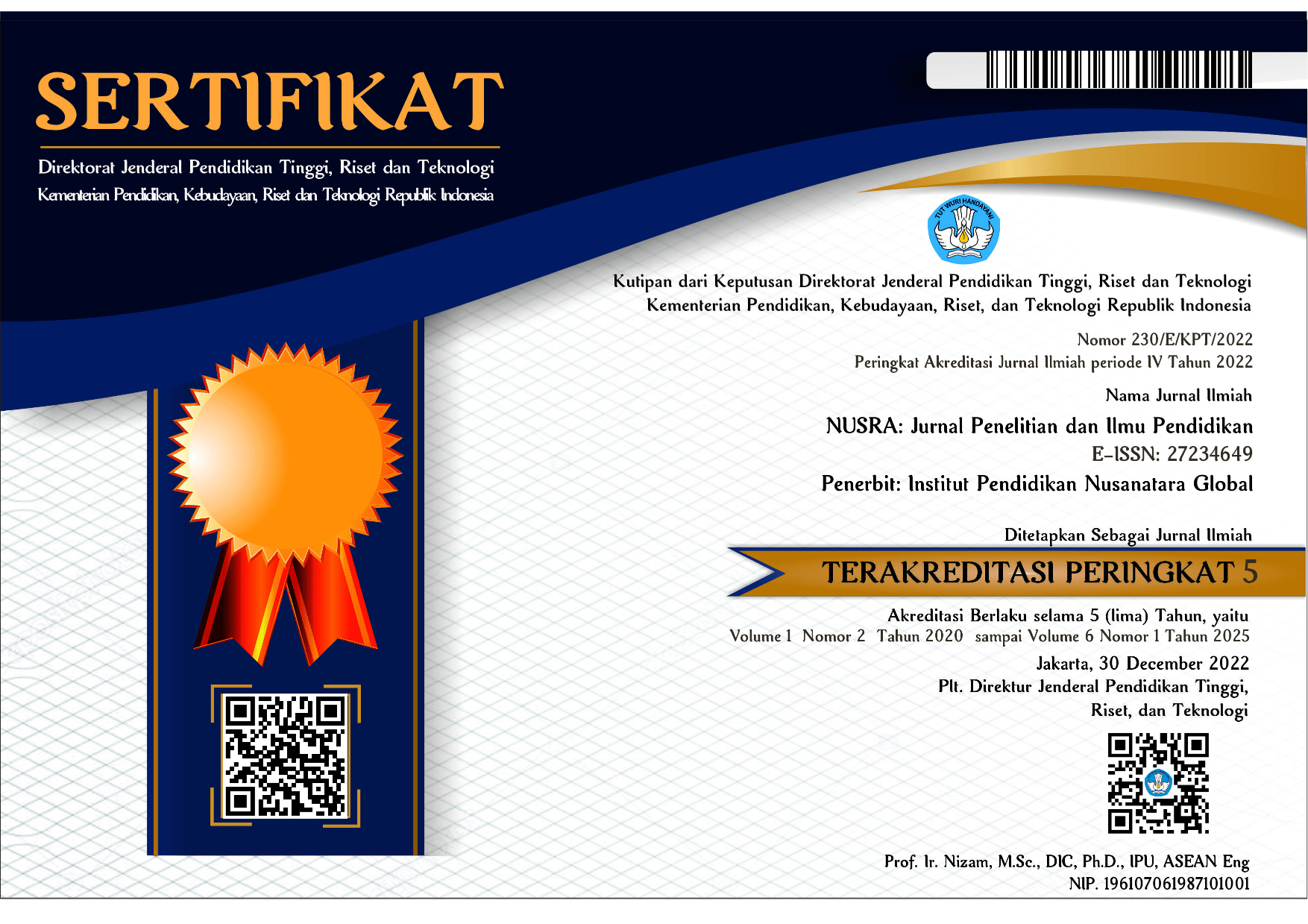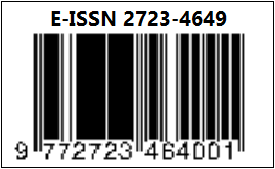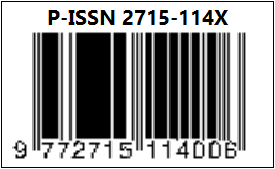Pengaruh Inovasi Pembelajaran Berbasis Proyek dalam Meningkatkan Kualitas Belajar Pada Siswa SMPIT Rabbi Radhiyya Curup
DOI:
https://doi.org/10.55681/nusra.v5i2.2675Keywords:
Inovation, Studying, Quality, EducationAbstract
This study aims to examine the influence of project-based learning innovations on improving the quality of learning among students at SMPIT Rabbi Radhiyya Curup. The study employs a descriptive qualitative research design. This design was chosen because the research objective is to gain a deep understanding of the impact of project-based learning innovation on student quality, as well as how this innovation's implementation is perceived and interpreted by students, teachers, and other relevant parties. The results of the study indicate that the implementation of project-based learning at SMPIT Rabbi Radhiyya Curup has proven to have significant goals and benefits in supporting the designated education program. Through this method, participants can develop a better understanding, critical skills, teamwork, and relevance to the real world.
Downloads
References
Apriliansyah, & Khoiri, Q. (2023). Inovasi dan Perubahan dalam Pendidikan Islam. Journal on Education, 05(02), 4805–4815.
Dewey, J. (2004). Experience and Education: Filsafat Pendidikan John Dewey. Mizan.
Hadi, M. N., Syaifullah, & Yusuf, W. F. (2022). Inovasi Pendidikan Agama Islam. Jurnal Mu’allim, 4(1), 53–66. https://doi.org/10.35891/muallim.v4i1.2948
Hasbullah. (2009). Dasar-Dasar Ilmu Pendidikan: Umum dan Agama Islam (1st ed.). Rajawali Pers.
Hasyim, I., Warsah, I., & Istan, M. (2022). Kompetensi Guru Pendidikan Agama Islam Dalam Pemanfaatan Teknologi untuk Pembelajaran Daring pada Masa Pandemik Covid-19. Journal of Education and Instruction (JOEAI), 4(2), 623–632. https://doi.org/10.31539/joeai.v4i2.3212
Kemendikbud. (2000). Kamus Besar Bahasa Indonesia Daring. Kemendikbud.Go.Id. https://kbbi.kemdikbud.go.id/
Kusnadi. (2017). Model Inovasi Pendidikan dengan Strategi Implementasi Konsep “Dare to Be Different.” Jurnal Wahana Pendidikan, 4(1), 132–144.
Naif, N. (2016). Urgensi Inovasi Pendidikan Islam: Menyatukan Dikotomi Pendidikan. Kordinat: Jurnal Komunikasi Antar Perguruan Tinggi Agama Islam, 15(1), 1–16. https://doi.org/10.15408/kordinat.v15i1.6304
Nirmayani, L. H., & Dewi, N. P. C. P. (2021). Model Pembelajaran Berbasis Proyek (Project Based Learning) Sesuai Pembelajaran Abad 21 Bermuatan Tri Kaya Parisudha. Jurnal Pedagogi Dan Pembelajaran, 4(3), 378. https://doi.org/10.23887/jp2.v4i3.39891
Rogers, E. M. (1983). Diffusion of Innovations. In The Free Press A Division of Macmillan Publishing Co. Inc (Third Edit). The Free Press. https://doi.org/10.4324/9780203710753-35
Rogers, E. M., Medina, U. E., Rivera, M. a, & Wiley, C. J. (2005). Complex Adaptive Systems and the Diffusion of Innovations. The Innovation Journal:The Public Sector Innovation Journal, 10(3), 1–26.
Salam, B. (1997). Pengantar Pedagogik: Dasar-Dasar Ilmu Mendidik (1st ed.). Rineka Cipta.
Sergiovanni, T. J. (1999). Building Community in Schools. John Wiley & Sons. https://ejournals.bc.edu/index.php/cej/article/download/583/572/579
Sugiyono. (2013). Metode penelitian pendidikan pendekatan kuantitatif, kualitatif dan R&D.
Susianti, E., Istan, M., & Hamengkubuwono. (2022). Online Learning Management System at SMPN 1 Rejang Lebong. Tadbir : Jurnal Studi Manajemen Pendidikan, 6(1), 71–102.
Syafaruddin, Asrul, & Mesiono. (2012). Inovasi Pendidikan: Suatu Analisis Terhadap Kebijakan Baru Pendidikan. In C. Wijaya & Usiono (Eds.), Perdana Publishing (1st ed.). Perdana Publishing.
Van den Hoven, J. (2013). Value sensitive design and responsible innovation. Responsible Innovation: Managing the Responsible Emergence of Science and Innovation in Society, 75–83.
Yanto, M. (2017). Evaluation of Quality Assurance Program. IJHCM (International Journal of Human Capital Management), 1(02), 146–152. https://doi.org/10.21009/ijhcm.012.16Yanto, M. (2020). Manajemen kepala Madrasah Ibtidaiyah dalam menumbuhkan pendidikan karakter religius pada era digital. Jurnal Konseling Dan Pendidikan, 8(3), 176. https://doi.org/10.29210/146300
Downloads
Published
How to Cite
Issue
Section
License
Copyright (c) 2024 Herawati Herawati, Tere Aderempas, Murniyanto Murniyanto, Muhammad Istan

This work is licensed under a Creative Commons Attribution-ShareAlike 4.0 International License.














